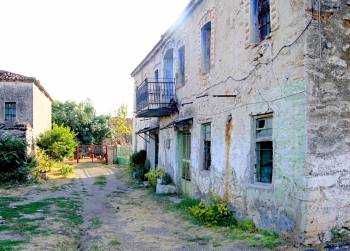“Girls have seven lives, the old woman reflected. Not much makes them ill and they seldom die….[But] the only ones with seven lives are the girl children of the lowest class! They seem to have been multiplied on purpose, to punish their parents with a foretaste of hell in this world….Would it not be right, if only humans were not so blind, to assist the scourge that fluttered in the angels’ wings, instead of trying to pray it away?”—Hadoula, a grandmother and “healer.”
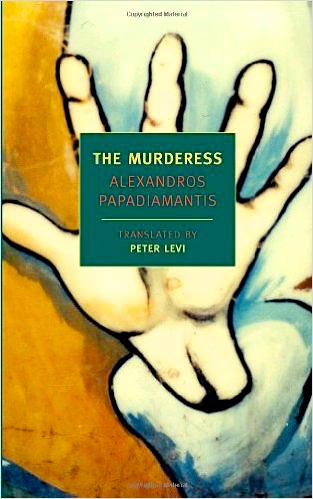 Written in the 1890s and first published in 1902, The Murderess by Alexandros Papadiamantis focuses on Hadoula, a poor woman of “scarcely sixty,” who has done little in her life other than serving others. As she explains in the opening chapter, she served her parents when she was a child, and, at seventeen, she became a slave to her husband and her children after that. Now she is slave to her grandchildren. Her eldest daughter Delcharo has just given birth to an infant who has been sick since its arrival, and Hadoula has been using the step of the fireplace beside the baby’s cradle as her pillow, watching over the sick child every night for two weeks, almost without sleep. Living in a rural area of the island of Skiathos in Greece, two hundred fifty kilometers northeast from Athens, Hadoula has few, if any, resources to improve her life, and even fewer resources to enable her to help her daughters make better marriages than she herself did. With seven children, including three daughters, she will be expected to provide significant dowries for the girls in terms of goods and property. Recently, the custom has evolved that a large cash donation is also expected before the family of the prospective husband will accept a bride for their son. Her two older sons are not able to help her out – they have emigrated to the west and are no longer in touch – and her husband, Iannis Frankos, is useless. Since he is not even able to add a simple sum, the only way Hadoula can get money for the house is to collect his salary herself, to make sure he has not been cheated by his employers, or trick him into giving her his earnings so she can count them. She often steals from him. That is better, she believes, than letting him spend everything he has on drink.
Written in the 1890s and first published in 1902, The Murderess by Alexandros Papadiamantis focuses on Hadoula, a poor woman of “scarcely sixty,” who has done little in her life other than serving others. As she explains in the opening chapter, she served her parents when she was a child, and, at seventeen, she became a slave to her husband and her children after that. Now she is slave to her grandchildren. Her eldest daughter Delcharo has just given birth to an infant who has been sick since its arrival, and Hadoula has been using the step of the fireplace beside the baby’s cradle as her pillow, watching over the sick child every night for two weeks, almost without sleep. Living in a rural area of the island of Skiathos in Greece, two hundred fifty kilometers northeast from Athens, Hadoula has few, if any, resources to improve her life, and even fewer resources to enable her to help her daughters make better marriages than she herself did. With seven children, including three daughters, she will be expected to provide significant dowries for the girls in terms of goods and property. Recently, the custom has evolved that a large cash donation is also expected before the family of the prospective husband will accept a bride for their son. Her two older sons are not able to help her out – they have emigrated to the west and are no longer in touch – and her husband, Iannis Frankos, is useless. Since he is not even able to add a simple sum, the only way Hadoula can get money for the house is to collect his salary herself, to make sure he has not been cheated by his employers, or trick him into giving her his earnings so she can count them. She often steals from him. That is better, she believes, than letting him spend everything he has on drink.
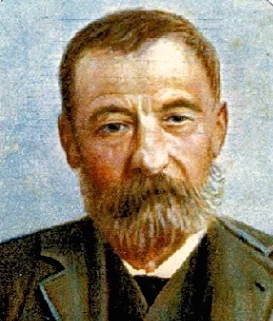 Papadiamantis (1851 – 1911) writes here about what he knows, having grown up on Skiathos, the son of a priest. After completing his education in Athens and studying as a monk on Athos, he began his writing career, then returned to Skiathos and remained there for the rest of his life, unmarried, and known as “a monk in the world.” In this novel, Papadiamantis’s observations about life on the island, especially among the poor, including those like Hadoula, are both sensitive and insightful, as he recognizes the helplessness of many inhabitants who are simply hanging on to life and trying to survive the best way they can, though they often have few choices open to them. Religion may have been important to the author, but he clearly recognizes in this novel that the natural world and the belief in dryads and folklore are at least equally as important to his characters on Skiathos. The vagaries of nature and the unexpected disasters that can occur without warning, even to those who follow strict religious guidelines, make daily life for his characters more closely allied with chance, fate, and the magical than with formal religion, and the universality of this belief makes the story of The Murderer intense and moving for the reader.
Papadiamantis (1851 – 1911) writes here about what he knows, having grown up on Skiathos, the son of a priest. After completing his education in Athens and studying as a monk on Athos, he began his writing career, then returned to Skiathos and remained there for the rest of his life, unmarried, and known as “a monk in the world.” In this novel, Papadiamantis’s observations about life on the island, especially among the poor, including those like Hadoula, are both sensitive and insightful, as he recognizes the helplessness of many inhabitants who are simply hanging on to life and trying to survive the best way they can, though they often have few choices open to them. Religion may have been important to the author, but he clearly recognizes in this novel that the natural world and the belief in dryads and folklore are at least equally as important to his characters on Skiathos. The vagaries of nature and the unexpected disasters that can occur without warning, even to those who follow strict religious guidelines, make daily life for his characters more closely allied with chance, fate, and the magical than with formal religion, and the universality of this belief makes the story of The Murderer intense and moving for the reader.
Known also as Frankissa, or Frankojannu, names associated with her husband’s family, not her own, Hadoula remains at the bedside of her baby grandchild, a little girl named for her during an emergency baptism when the baby’s prospects looked particularly bleak. She cannot help praying her accustomed prayer for little girls, however. “May they not survive! May they go no further.” As Hadoula thinks about the future of her youngest daughter Krinio, who is still unmarried, she muses, “Do there really have to be so many daughters? And if so, is it worth the trouble of bringing them up? Isn’t there…always death and always a cliff? Better for them to make haste above.” And finally, she begins to draw even more conclusions. “Would it not really be right, if only humans were not so blind, to assist the scourge that fluttered in the angels’ wings, instead of trying to pray it away?’ By the time her other single daughter Amersa comes to her late one night confessing that she has had a dream in which the baby has died, Hadoula’s “brain had begun to smoke” and she “had gone out of her mind.”
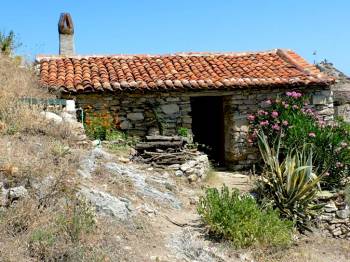
A much smaller old house on Skiathos, belonging to a rural family like Hadoula’s, barely getting by.
Considering the title to this book, the end results of this scene should be no surprise to the reader, nor should Hadoula’s cleverness in covering up. What does surprise is her overwhelming sense of remorse and worry, followed by her desire to go to St. John in Hiding, a deserted and crumbling monastery in the northern mountains of Skiathos, where she hopes to receive a sign from St. John, after a long thoughtful walk into the nature in which she herself grew up. On her way back home, she believes she sees the sought-after sign – two little girls, playing on the edge of a well outside a family’s cottage, their mother desperately ill inside. Again, she does what she believes is in the best interest of all, but when the authorities eventually decide they want to ask her some questions about this and other situations, she panics and hurries back out into the deep woods on the north coast of the island, with “bandits’ lairs, untrodden spots, caves and rocks where wild herbs grow.” Her night-time dreams there in the Black Cave are terrifying to her, though she continues, unsuccessfully, to try to find some kind of solace from religion and the Rock of the Holy Saviour.
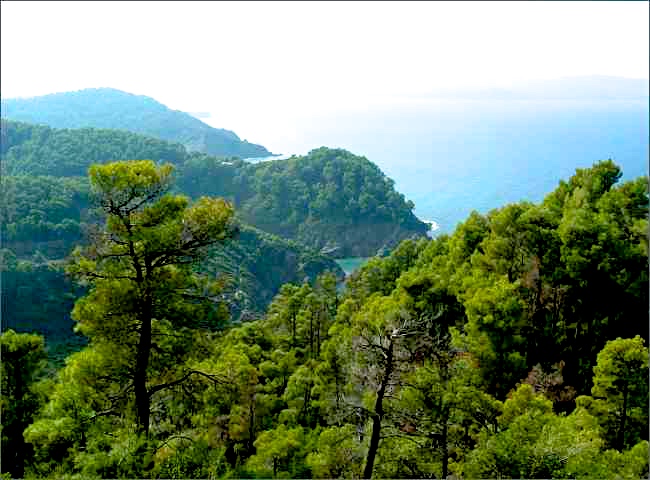
The lush hills, filled with hiding places and caves, on the north of Skiathos, where Hadoula grew up and to which she returns.
Throughout the novel, the author creates empathy for Hadoula, showing he understands her submission to the evil forces which have made her what she is at the end of the novel, but that he also understands the desperation which impelled her to take action. It is in this respect, with its philosophical questioning and universal emotions, that this novel comes alive and feels so modern, despite the actual differences in time, and social and cultural context. A mother’s desperation, her helplessness against seemingly impossible odds, and her genuine belief that she is acting with a good heart and higher goals are impossible to ignore, however horrifying the results of her actions may be. Papadiamantis provides no automatic answers, nor does he second-guess Hadoula’s decisions or moralize about them, considering her limited choices and her poverty. He maintains his distance and leaves it to the reader to understand or condemn, much as Hadoula herself has tried to do in her own life.
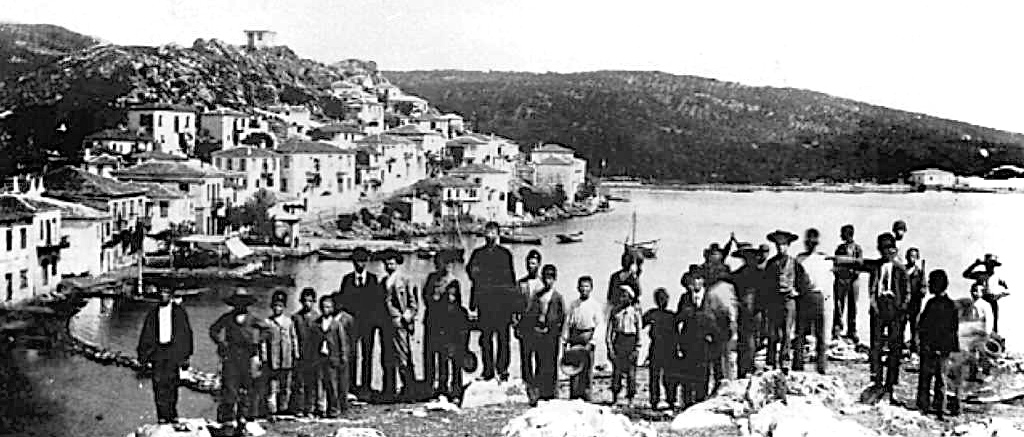
Residents of Skiathos come out to the port around 1900. Note that all of them are men.
Photos, in order: The author’s photo appears on http://greece.greekreporter.com/2013/11/22/
The middle-class house near the port, from 1900, is far more elegant than anything Hadoula could ever dream of owning: http://www.greece.com
The much smaller antique house in the rural north of the island is more typical of what Hadoula and her family would occupy. http://www.skiathos-walks.co.uk/
The mountains to the north, where Hadoula grew up, provide woods and caves where she and others can hide, if necessary. http://www.olympic-spirit.net/
At the port of Skiathos, people gather for some activity. As one would expect from what Hadoula has said, all of them are men. http://skiathosisland.com/
